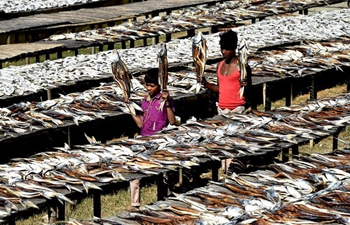ANKARA, Jan. 8 (Xinhua) -- Turkey has made progress on tobacco control in recent years with bans, regulations, media campaigns and health programs, yet smoking is still a big and lingering problem in the country.
"Smoke like a Turk," the expression defining the entrenched habit of the Turkish population to smoke, is in fact no more since a draconian but popular ban was imposed a decade ago.
In 2009, in a landmark move, Turkey banned smoking in all indoor spaces, including restaurants, bars and cafes. One year later, the ban was extended to smoking in various sites such as stadiums, mosque courtyards and hospitals.
Turkish President Recep Tayyip Erdogan, a staunch teetotaler, is credited for the effective implementation of the ban that significantly limits space for smokers. Apart from the ban, the country imposes higher taxes on cigarettes and provides free medicine and treatment for smokers.
Authorities have also introduced plain packaging to further discourage smokers starting from Jan. 1, 2019.
Cigarettes and other tobacco products must be sold in uniform packages with a prominent display of health warnings and only a smaller space for the name of the brand.
The logo of the tobacco company or the brand will also be absent on the new packages. The law stipulates the text of health warnings, already covering considerable space in packaging, to be increased to cover 85 percent of the package. The name of the brand will only be displayed on one face of the pack.
Turkey plans more measures against smoking in the coming years.
Last summer, the government introduced the 2018-2023 action plan for tobacco control that includes shorter shifts for non-smoking employees at workplaces and raising the minimum age for eligibility to buy cigarettes and other tobacco products from 18 to 21.
Still the use of tobacco remains a serious burden for Turkey's public health and economy.
According to a report published by health authorities in early 2018, the state spends nine percent of its healthcare expenditure for diseases linked to the use of tobacco products.
Every year 100,000 people die in Turkey because of illnesses related to nicotine addiction, mostly from cardiovascular and lung diseases.
This addiction is also very costly as these diseases are expensive to treat. Turkey, which is determined to reduce the mortality rate related to tobacco use, spends around 11 billion dollars each year for treatment of smokers, said health experts.
Turkey, with a population of more than 80 million people, has currently about 15 million smokers, most of which are men, according to the World Health Organization (WHO).
Specialists warn that authorities should punish violators of smoking bans around the country, especially in big cities, and not turn a blind eye to public places which find ways to bend the laws to allow people to smoke in banned premises.
Cevdet Erdol, a professor of medicine and a former health minister who is currently the President of Health Sciences University, said that the rate of smokers in Turkey, which went down to 27.1 percent in 2012, increased to 31.6 percent of the population in 2018.
"Even the lawmakers who voted in favor of the anti-tobacco law are smoking in their chambers in parliament," said Erdol, adding that the ban was also not enforced properly in police buildings and courthouses by the force which is supposed to make sure the bans' implementation.
"We cannot fight against the problem if it continues like this," he added.
Another major problem is the nargile or water-pipe cafes, an ancient tradition dating back to the Ottoman Empire which has enjoyed a revival in the last decade in Turkey.
"We have only organic tobacco or fruit flavored ones which are really light," Ismail Yolcu, the manager of a popular male-dominated hookah cafe in the residential Yildiz neighborhood of Ankara, said to Xinhua.
"We don't accept youngsters and provide only the best product for our clients," he insisted. Yolcu smiled when he was asked if he knew the tobacco they are serving is largely considered as or even more harmful than cigarettes.
Smoking the hookah for one hour is equivalent to inhaling the volume of smoke from 100 to 200 cigarettes, according to experts.
"Well, it's a tradition and people like to perpetuate it," added Yolcu, saying that banning hookah cafes will be bad for the trade as the economy is slowing down.
"I am not planning to give it up. I am aware that there are health hazards but it's really fun to gather up with friends and have a nice and long conversation around a cup of tea and a hookah smoke once in a while," said Aydin, a 27-year-old lawyer in the shop.













